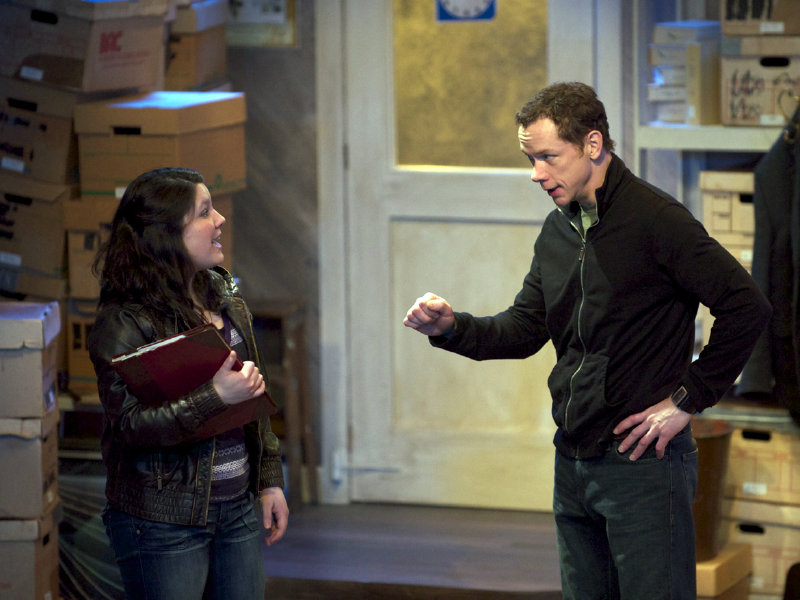Prolific playwright Theresa Rebeck does not rank in the top tier of contemporary American dramatists, but she is a reliable provider of well-written and entertaining theater. The Milwaukee Chamber Theatre has a lengthy history of contributing well-acted and staged productions to our bountiful buffet of first class local theater.
This is why the Chamber's recently opened staging of Rebeck's "Mauritius" is such a surprising disappointment. The playwright and the theater company are not showing us their A-game.
"Mauritius" takes its title from the island nation that is 560 miles off the coast of Madagascar. It was among the first countries to issue postage stamps, and two of them from 1847 are highly prized and enormously valuable in the world of philately.
Rebeck used that fact as the central point in her suspense drama. A personal collection that includes the trophy stamps has become part of the estate of a recently deceased woman, and two half-sisters, Jackie and Mary, are fighting over possession of it. The collection was assembled by Mary's late grandfather and passed on to the mother the two young women shared.
Mary distanced herself from her family when she became an adult while Jackie cared for their mother in her declining years. Now they are sifting through the mother's belongings after her death, and a conflict flares over the stamps. Mary claims the collection as her most tangible connection to her beloved grandfather.
Jackie says their mother specifically gave the stamps to her as a reward for her loyalty and devotion in difficult times. The young woman apparently has money problems, and she plans to sell the collection.
An attempt to have the stamps appraised puts the collection on the radar of a trio of shadowy characters lurking around the edges of the philatelic universe, and they set out to get hold of the Mauritian treasures with a mixture of bullying and sweet talk. But this is an uneasy alliance, and double crosses, maybe even triple crosses, enter the plot.
Looming over all of this is the possibility that the key stamps are fake. Their stratospheric value has prompted the appearance of forgeries on the philatelic market in the past.
"Mauritius" is so similar to David Mamet's 1975 masterpiece "American Buffalo," it begs comparison. In that drama, three squabbling small-time hustlers attempt to score big by getting their hands on a valuable coin collection. Rebeck can't match Mamet's mammoth gift for dialogue and his ability to create devilishly colorful characters.
None of the "Mauritius" characters are developed, and too many loose plot ends are allowed to go unexplained. Hints are dropped about a huge rupture in the half-sisters' family, but we are not given further details. Ditto for the relationship between two of the conspirators.
A superbly crafted thriller doesn't need depth, but "Mauritius" is not in that league.
The Chamber production, under the direction of Andrew Volkoff, doesn't give the play any help. Sara Zientek and Betsy Skowbo, portraying Jackie and Mary, play the sisters at such a feverishly screechy volume they are fingernails across a chalkboard. One wants them to just go away.
Drew Brhel's portrait of the tough-talking wannabe owner of the rare stamps is a caricature of a movie heavy. His rapture over seeing and touching two tiny pieces of paper feels artificial because his character seems incapable of the sensitivity such appreciation requires.
Jonathan Wainwright's master hustler appropriately turns from charming to menacing on a dime. Playing a cantankerous stamp appraiser and store owner, C. Michael Wright is the only actor who provides nuance in his work.
"Becky Shaw" at the Boulevard
Bay View's Boulevard Ensemble Theatre admirably doesn't play it safe in its play selection. Artistic director Mark Bucher often chooses to stage eccentric and slightly unconventional theater pieces that have received favorable attention in New York.
But the Boulevard is a space for developing actors, and sometimes the company bites off more than it can chew. Such is the case with its current production of "Becky Shaw," a comedy of ferociously bad manners.
Two couples, one of them married, are the focus of this relationship play, and the piece is chock full of comments and observations about ethics, responsibilities and the way intimates deal with each other. The moral ground frequently shifts. An acerbic tone and withering cynicism are often the weapons employed.
"Becky Shaw" requires deft and experienced actors capable of effectively navigating its complicated landscape. The Boulevard cast gamely tries but comes up short.
Damien has been around so long, he was at Summerfest the night George Carlin was arrested for speaking the seven dirty words you can't say on TV. He was also at the Uptown Theatre the night Bruce Springsteen's first Milwaukee concert was interrupted for three hours by a bomb scare. Damien was reviewing the concert for the Milwaukee Journal. He wrote for the Journal and Journal Sentinel for 37 years, the last 29 as theater critic.
During those years, Damien served two terms on the board of the American Theatre Critics Association, a term on the board of the association's foundation, and he studied the Latinization of American culture in a University of Southern California fellowship program. Damien also hosted his own arts radio program, "Milwaukee Presents with Damien Jaques," on WHAD for eight years.
Travel, books and, not surprisingly, theater top the list of Damien's interests. A news junkie, he is particularly plugged into politics and international affairs, but he also closely follows the Brewers, Packers and Marquette baskeball. Damien lives downtown, within easy walking distance of most of the theaters he attends.







